
Dec 11
/
Victor Arduin
Macroeconomics Weekly Report - 2023 12 11
Back to main blog page
"Brazil's gross domestic product (GDP) growth rate in the third quarter of 2023 was 0.1%, bringing the year-to-date figure to 3.2%. Market expects this trend to be maintained (ou to linger) until the end of 2023."
Brazil's economy surprises, but investment rate is falling
- The Brazilian economy had a very positive 2023, with upward revisions to its growth projections many times throughout the year.
- Once inflation fell to more comfortable levels, Brazil's Central Bank began to cut its interest rates, which benefited risk assets and created a more favorable environment for GDP expansion.
- However, some worrying signs need to be taken into account. Investment rates and gross savings are falling in the country, a sign that the country's productive capacity may face more challenges in the long-term as it depends on capital for expansion.
Introduction
Brazil's gross domestic product (GDP) growth rate in the third quarter of 2023 was 0.1%, bringing the year-to-date figure to 3.2%. Market expects this trend to be maintained (ou to linger) until the end of 2023. In this context, risk assets, reflected by the Ibovespa Index, have accumulated gains in recent months, and the dollar has remained stable, below R$5.00.
However, other data is worrying and should be considered carefully. The country's investment rate is falling, as is gross savings formation. This tends to reduce long-term growth potential. In addition, the country's fiscal balance looks like it will take longer to be achieved, which could put pressure on inflation at some point, increasing uncertainty and creating an environment for higher interest rates.
Image 1: Accumulated Inflation 12 Months (%)
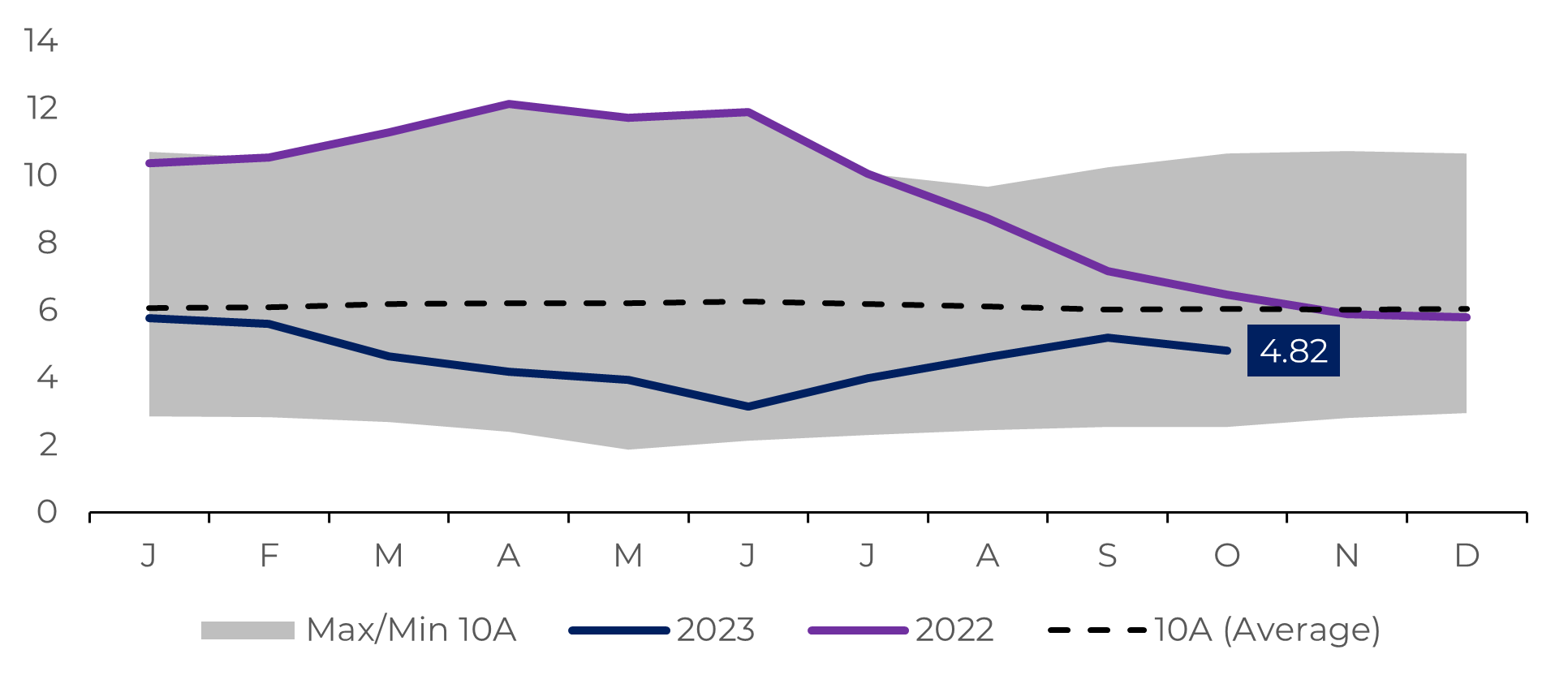
Source: IBGE
Image 2: Ibovespa Index
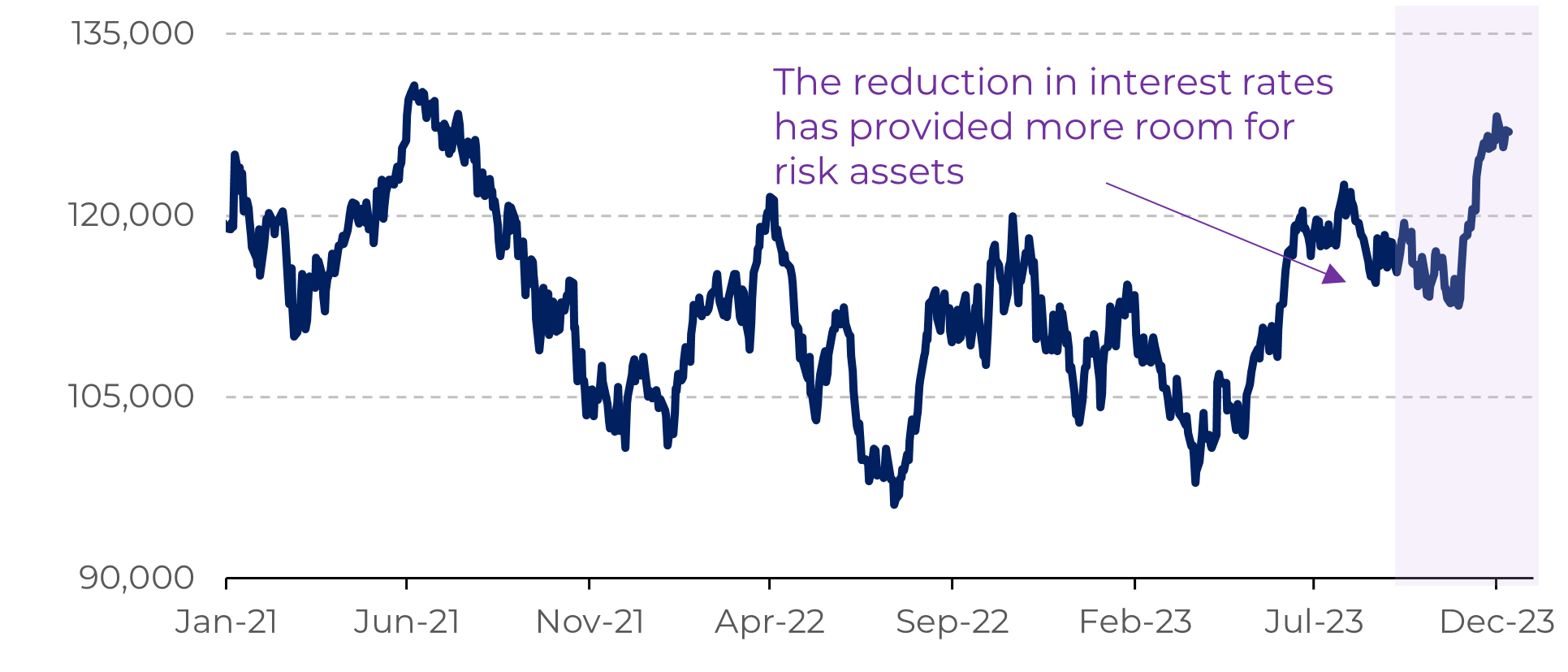
Source: Refinitiv
A less restrictive interest rate environment boosts risk assets
The Central Bank of Brazil (Bacen) began reducing the basic interest rate (Selic) in August 2023. Since then, the Brazilian stock market has appreciated, reflecting investors' greater appetite for risk. The Bacen is expected to continue reducing the Selic at the Monetary Policy Committee (Copom) meeting on Wednesday (13), with a probable drop of 50 basis points (bps).
Not only the domestic scenario, but also the international one is encouraging. Data from the US shows that inflation is converging towards the 2% target, with signs of a slowdown in the labor market, albeit resilient. This strengthens the scenario of an interest rate cut in the world's largest economy in the first half of 2024, paving the way for the Bacen to follow its policy of cutting interest rates.
Image 3: GDP Quarterly Rate Against Previous Quarter (%)
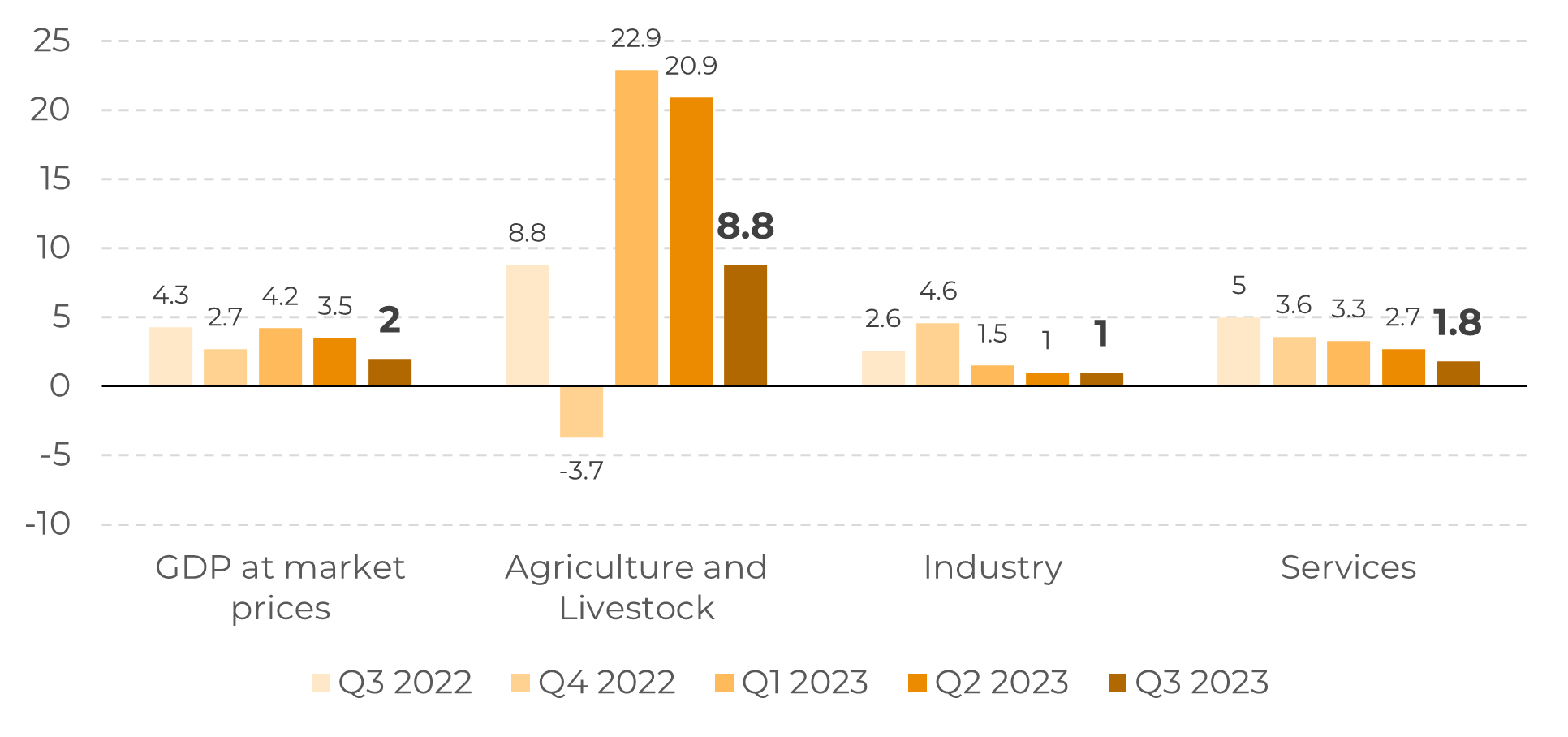
Source: Refinitiv
Recently, Brazilian GDP data was a surprise, with growth of 0.1% (projections pointed to -0.3%). Looking at the components of production, services and industry were the main highlights, with growth of 0.6% in both sectors. Agriculture, which enjoyed exceptional growth in the first quarter of the year, registered -3.3% in the last quarter, erasing part of its accumulated gains in 2023.
In general, projections indicate that Brazil should grow by around 3% this year, a very positive performance given the high and restrictive interest rate environment. However, some points of caution should be noted. The investment and savings rate fell from 18.3% to 16.3% compared to the same period last year. For the time being, the economy reflects the optimism of the country's disinflation process. However, it is important to think about long-term sustainable development, which depends on investment, and currently reducing.
In general, projections indicate that Brazil should grow by around 3% this year, a very positive performance given the high and restrictive interest rate environment. However, some points of caution should be noted. The investment and savings rate fell from 18.3% to 16.3% compared to the same period last year. For the time being, the economy reflects the optimism of the country's disinflation process. However, it is important to think about long-term sustainable development, which depends on investment, and currently reducing.
Image 4: Investment Rate and Gross Savings Rate (%) - Brazil
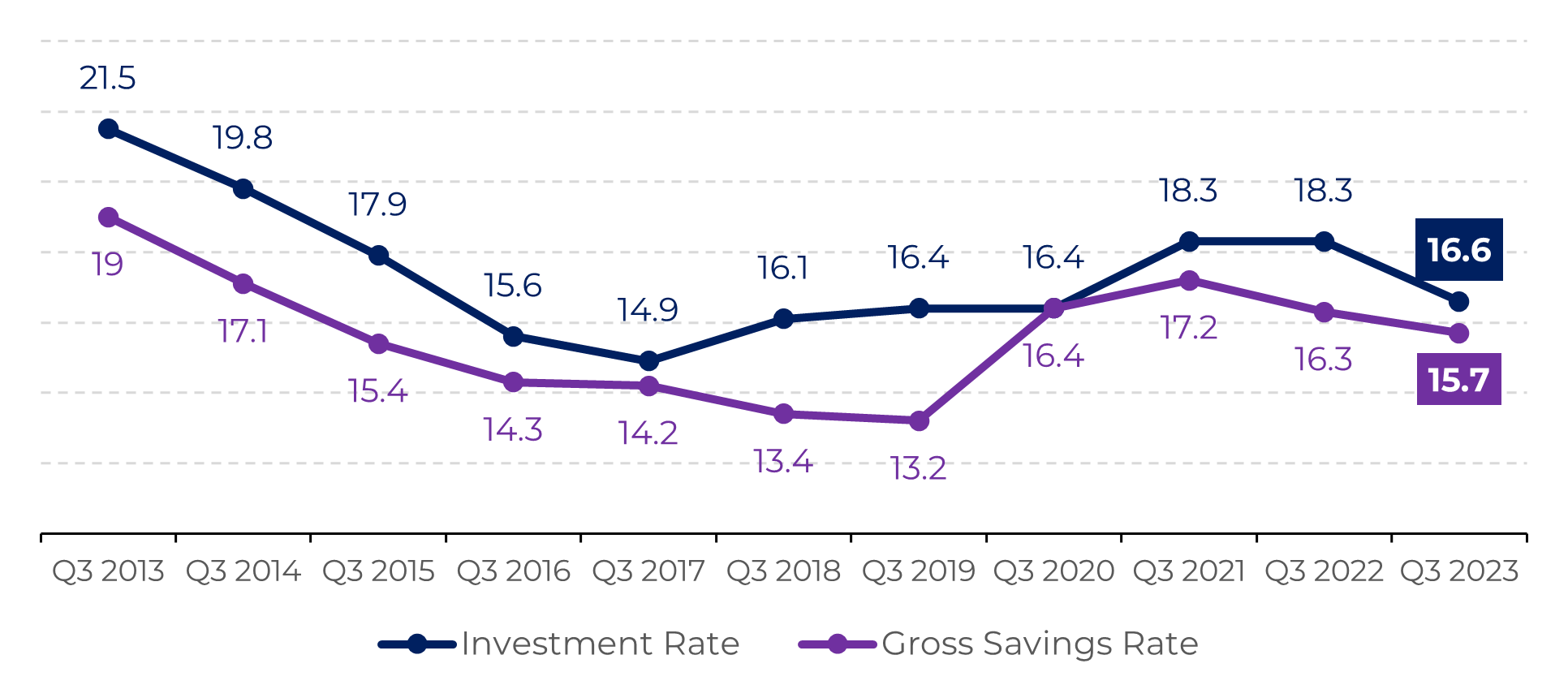
Source: Refinitiv
Risks persist with public sector debt
While on one hand, the economic data is optimistic, on the other hand the country's growing debt is worrying and could be an obstacle to future growth. Despite the government's efforts to improve the primary result by raising more revenue, the net debt continues to increase with new government spending.
If fiscal balance is not achieved in the medium term, this should result in higher interest rates in the economy at some point, should the Central Bank stick to its goal of keeping inflation at 3% from 2024 to 2026. Alternatively, the government could change the inflation target, accommodating a higher price environment. However, this would result in a shock to investors' expectations, diminishing the country's attractiveness and damaging its medium and long-term growth.
Image 5: Net Debt Vs Primary Result - Brazil
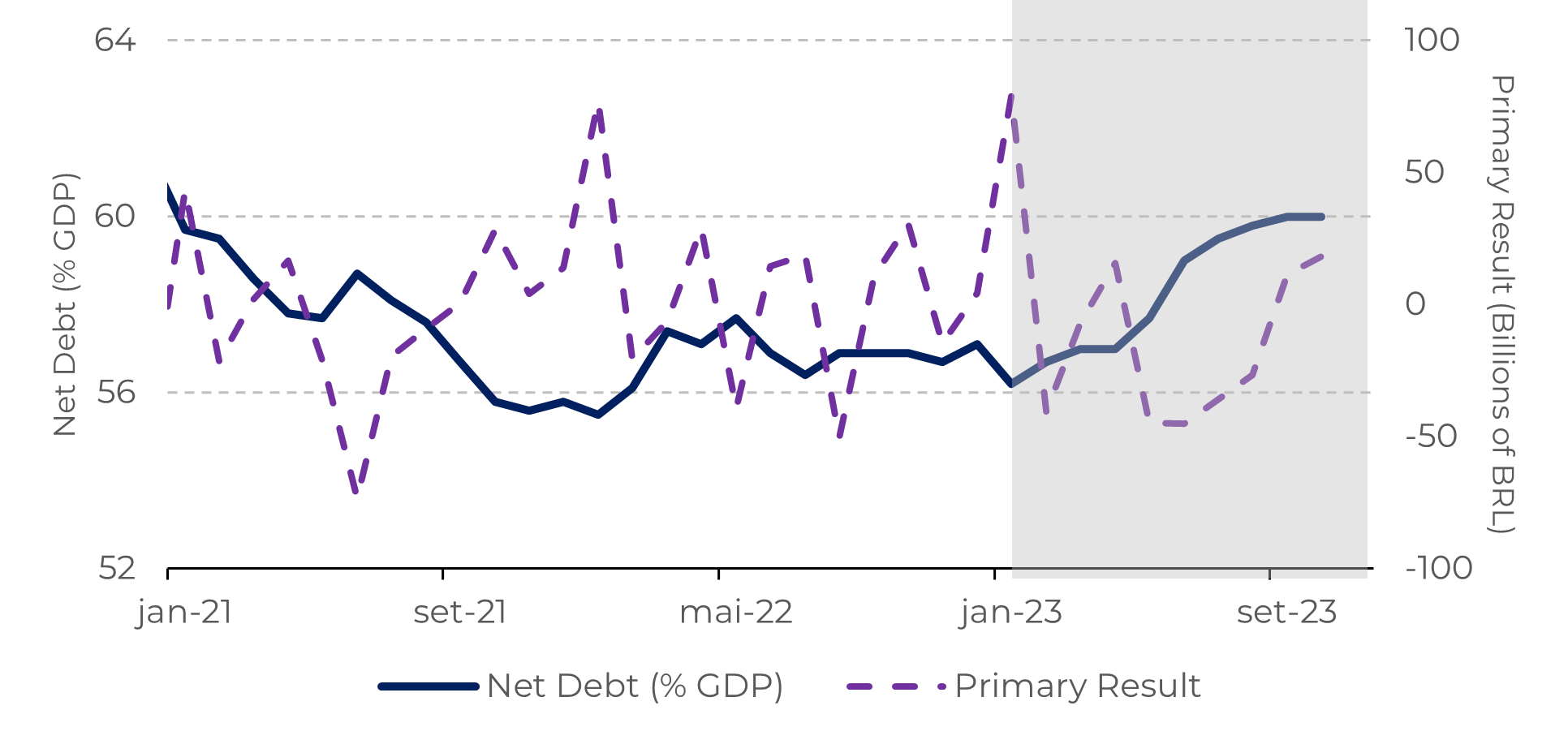
Source: Refinitiv
In Summary
The strong GDP expansion this year shows that interest rates may not have been as restrictive as previously thought. With inflation under control and converging toward the target, there is no reason to change the pace of interest rate cuts.
Brazil's economic growth has been surprising in the post-pandemic period, probably as a result of structural reforms in recent years that have helped bring more dynamism to the Brazilian economy, such as the autonomy of the Central Bank.
However, the country still faces significant challenges. Fiscal balance has been one of the main difficulties in Brazilian politics, as the pressure for more public spending has undermined the primary result, even with a major effort to increase revenue.
Weekly Report — Macro
Written by Victor Arduin
victor.arduin@hedgepointglobal.com
victor.arduin@hedgepointglobal.com
Reviewed by Livea Coda
livea.coda@hedgepointglobal.com
livea.coda@hedgepointglobal.com
www.hedgepointglobal.com
Disclaimer
This document has been prepared by hEDGEpoint Global Markets LLC and its affiliates ("HPGM") exclusively for informational and instructional purposes, without the purpose of creating obligations or commitments with third parties, and is not intended to promote an offer, or solicitation of an offer, to sell or buy any securities or investment products. HPGM and its associates expressly disclaim any use of the information contained herein that may result in direct or indirect damage of any kind. If you have any questions that are not resolved in the first instance of contact with the client (client.services@hedgepointglobal.com), please contact our internal ombudsman channel (ouvidoria@hedgepointglobal.com) or 0800-878-8408 (for clients in Brazil only).
Contact us
hedgepointhub.support@hedgepointglobal.com
ouvidoria@hedgepointglobal.com
Funchal Street, 418, 18º floor - Vila Olímpia São Paulo, SP, Brasil
Check our general terms and important notices.
This page has been prepared by Hedgepoint Schweiz AG and its affiliates (“Hedgepoint”) solely for informational and instructional purposes, without the purpose of instituting obligations or commitments to third parties, nor is it intended to promote an offer, or solicitation of an offer of sale or purchase relating to any securities, commodities interests or investment products. Hedgepoint and its associates expressly disclaim any use of the information contained herein that directly or indirectly result in damages or damages of any kind. Information is obtained from sources which we believe to be reliable, but we do not warrant or guarantee the timeliness or accuracy of this information. The trading of commodities interests such as futures, options, and swaps involves substantial risk of loss and may not be suitable for all investors. You should carefully consider wither such trading is suitable for you in light of your financial condition. Past performance is not necessarily indicative of future results. Customers should rely on their own independent judgement and/or advisors before entering in any transaction.Hedgepoint does not provide legal, tax or accounting advice and you are responsible for seeking any such advice separately.Hedgepoint Schweiz AG is organized, incorporated, and existing under the laws of Switzerland, is filiated to ARIF, the Association Romande des Intermédiaires Financiers, which is a FINMA-authorized Self-Regulatory Organization. Hedgepoint Commodities LLC is organized, incorporated, and existing under the laws of the USA, and is authorized and regulated by the Commodity Futures Trading Commission (CFTC) and a member of the National Futures Association (NFA) to act as an Introducing Broker and Commodity Trading Advisor. HedgePoint Global Markets Limited is Regulated by the Dubai Financial Services Authority. The content is directed at Professional Clients and not Retail Clients. Hedgepoint Global Markets PTE. Ltd is organized, incorporated, and existing under the laws of Singapore, exempted from obtaining a financial services license as per the Second Schedule of the Securities and Futures (Licensing and Conduct of Business) Act, by the Monetary Authority of Singapore (MAS). Hedgepoint Global Markets DTVM Ltda. is authorized and regulated in Brazil by the Central Bank of Brazil (BCB) and the Brazilian Securities Commission (CVM). Hedgepoint Serviços Ltda. is organized, incorporated, and existing under the laws of Brazil. Hedgepoint Global Markets S.A. is organized, incorporated, and existing under the laws of Uruguay. In case of questions not resolved by the first instance of customer contact (client.services@Hedgepointglobal.com), please contact internal ombudsman channel (ombudsman@hedgepointglobal.com – global or ouvidoria@hedgepointglobal.com – Brazil only) or call 0800-8788408 (Brazil only).Integrity, ethics, and transparency are values that guide our culture. To further strengthen our practices, Hedgepoint has a whistleblower channel for employees and third-parties by e-mail ethicline@hedgepointglobal.com or forms Ethic Line – Hedgepoint Global Markets.Security note: All contacts with customers and partners are conducted exclusively through our domain @hedgepointglobal.com. Do not accept any information, bills, statements or requests from different domains and pay special attention to any variations in letters or spelling, as they may indicate a fraudulent situation.“HedgePoint” and the “HedgePoint” logo are marks for the exclusive use of HedgePoint and/or its affiliates. Use or reproduction is prohibited, unless expressly authorized by HedgePoint. Furthermore, the use of any other marks in this document has been authorized for identification purposes only. It does not, therefore, imply any rights of HedgePoint in these marks or imply endorsement, association or seal by the owners of these marks with HedgePoint or its affiliates.
We have updated our Terms & Conditions to reflect improvements to our platform, data handling practices, and the overall experience we provide to our clients.
To continue using the Hedgepoint HUB, please review and accept the updated terms.

